2019高考英语语法突破四大篇第一部分专题2非谓语动词讲义
- 格式:doc
- 大小:151.00 KB
- 文档页数:11
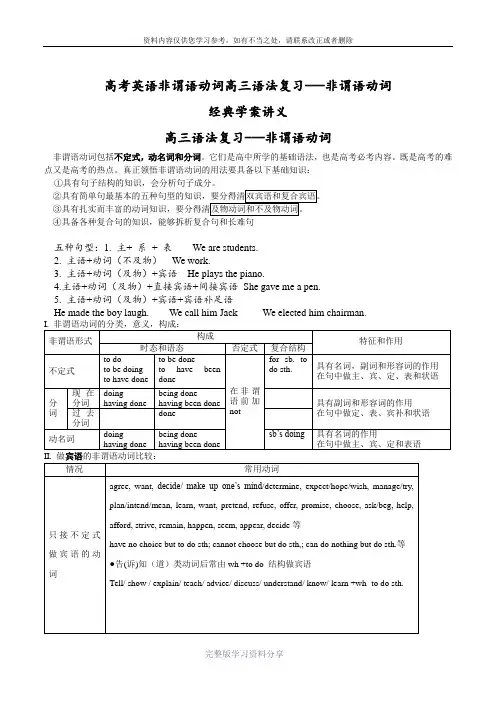
高考英语非谓语动词高三语法复习---非谓语动词经典学案讲义高三语法复习---非谓语动词非谓语动词包括不定式,动名词和分词。
它们是高中所学的基础语法,也是高考必考内容。
既是高考的难点又是高考的热点。
真正领悟非谓语动词的用法要具备以下基础知识:①具有句子结构的知识,会分析句子成分。
④具备各种复合句的知识,能够拆析复合句和长难句五种句型:1. 主+ 系+ 表We are students.2. 主语+动词(不及物)We work.3. 主语+动词(及物)+宾语He plays the piano.4.主语+动词(及物)+直接宾语+间接宾语She gave me a pen.5. 主语+动词(及物)+宾语+宾语补足语He made the boy laugh. We call him Jack We elected him chairman.(有些动词后面只能用Ving 做宾语,有些只能用不定式做宾语,有些两者皆可。
必须弄清以下常考词的搭配、意义及区别)A:不定式做宾语练习(解题技巧:记忆动词搭配, 做题事半功倍):1 To tell you the truth, I’d rather read than watch television; the programs seem _____ all the time.A. to get worseB. to be getting worseC. to have got worseD. getting worse2 I don't know whether you happen ______ it , but I'm going to study in the U.S.A. this September.A. to be heardB. to be hearingC. to hearD. to have heard3. Do let your mother know all the truth. She appears ______ everything.A.to tellB. to be toldC. to be tellingD. to have been told4 Having a trip abroad is certainly good for the old couple, but it remains ______ whether they will enjoy it. A. to see B. to be seen C. seeing D. seen5 When his father came back, the boy pretended ________his homework.A doingB to doC to doingD to be doingB 动名词做宾语练习:1 . I am busy _____ for the entrance examination, so I can’t help _____ housework at home.A. preparing; doingB. preparing; to doC. to prepare; doingD. to prepare; to do2 Whatever trouble Mr. White had ____ with the case, he would stick to his own opinion.A. dealB. to dealC. dealtD. dealing3 The woman found it no good _____ her daughter too much money.A. givingB. being givenC. givenD. gave4 Rather than ___ on a crowded bus ,he always perfers ___ a bicycle.A ride ;rideB riding ; rideC ride ; to rideD to ride ; riding5 Tony was very unhappy for ______ to the party.A. having not been invitedB. not having invitedC. having not invitedD. not having been invited6 One learns a language by making mistakes and ______ them.A. correctB. correctingC. correctsD. to correct7 I really appreciate ______ to relax with you on this nice island.A. to have had timeB. have timeC. to have timeD. having time8 Sandy could do nothing but ______ teacher that he was wrong.A. admitB. admittedC. admittingD. to admit9 Mr. Reed made up his mind to devote all he had to ______ some schools for poor children.A. set upB. setting upC. have set upD. having set up10 In order to gain a bigger share in the international market, many state-run companies are striving ______ theirproducts more competitive.A. to makeB. makingC. to have madeD. having made)11 Victor apologized for ______ to inform me of the change in the plan.A. his being not ableB. him not to be ableC. his not being ableD. him to be not able12 The first thing that probably needs _____is to ask your mother’s advice.A to doB to be doneC being doneD be done13 I had no choice but ________.A do as you tell meB to do as you told meC to do what you’ll sayD doing as you say14 Police are now searching for a woman who is reported to ______ since the flood hit the area last Friday.A have been missingB have got lostC be missingD get lost15 They look forward with hope ________ a chance to receive further education.A of gettingB to getC to gettingD in getting宾语补足语的区别:练习:(解题技巧:记固定搭配,辩逻辑关系)A 固定句型sb/sth be said/believed/ reported/ considered/ thought to do /to be doing /to have done 要分清练习:1 Linda is thought to_____ in Africa, but I really don’t know what country she’s working in.A. have workedB. workC. be workingD. be worked2 Robert is said _____ abroad ,but I don’t know what country he studied in.A to have studiedB to studyC to be studyingD to have been studying3 The flu is believed ______ by viruses that like to reproduce in the cells inside the human nose and throat.A. causingB. being causedC. to be causedD. to have caused4 John Bell was generally considered ________ the first telephone.A inventingB to inventC having inventedD to have invented.B 弄清以下搭配及其意义1.感官动词see, watch, observe, hear, listen to, notice等后面的宾补有3种形式(do/doing/done),doing表主动或正在进行,done表被动或完成,do表主动和完成(被动句中to 还原)。


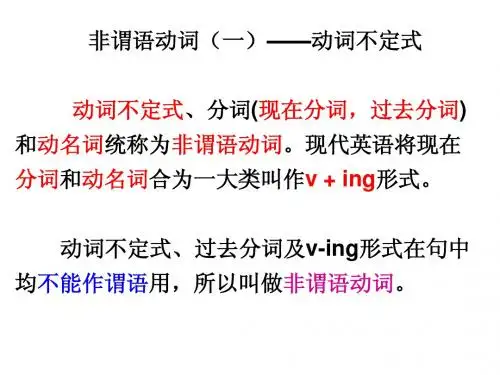

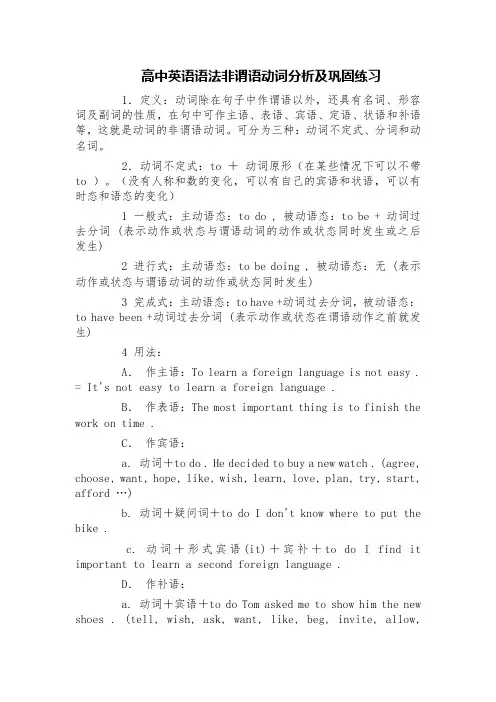
高中英语语法非谓语动词分析及巩固练习1.定义:动词除在句子中作谓语以外,还具有名词、形容词及副词的性质,在句中可作主语、表语、宾语、定语、状语和补语等,这就是动词的非谓语动词。
可分为三种:动词不定式、分词和动名词。
2.动词不定式:to +动词原形(在某些情况下可以不带to )。
(没有人称和数的变化,可以有自己的宾语和状语,可以有时态和语态的变化)1 一般式:主动语态:to do , 被动语态:to be + 动词过去分词 (表示动作或状态与谓语动词的动作或状态同时发生或之后发生)2 进行式:主动语态:to be doing , 被动语态:无 (表示动作或状态与谓语动词的动作或状态同时发生)3 完成式:主动语态:to have +动词过去分词,被动语态:to have been +动词过去分词 (表示动作或状态在谓语动作之前就发生)4 用法:A.作主语:To learn a foreign language is not easy . = It's not easy to learn a foreign language .B.作表语:The most important thing is to finish the work on time .C.作宾语:a. 动词+to do . He decided to buy a new watch . (agree, choose, want, hope, like, wish, learn, love, plan, try, start, afford …)b. 动词+疑问词+to do I don't know where to put the bike .c. 动词+形式宾语(it)+宾补+to do I find it important to learn a second foreign language .D.作补语:a. 动词+宾语+to do Tom asked me to show him the new shoes . (tell, wish, ask, want, like, beg, invite, allow,encourage…)b. 动词+宾语+不带to的动词 He often saw Tom play football .(see, hear, feel, watch, notice, have, make, let…)E.作状语:a. 表示目的:He went to Guangzhou to see his sons . He got up early in order to catch the first bus .b. 表示结果:He is too tired to walk any farther . They aren't old enough to go to school .c. 表示原因:He is sorry to hear that . I am glad to see you .F.作定语: I have something to tell you . I want to buy something to eat .5 动词不定式to 的省略:A.在感官动词feel, hear, see, watch, notice 及使役动词have, let, make等后面要省to,但在变被动语态时要还原不定式to。


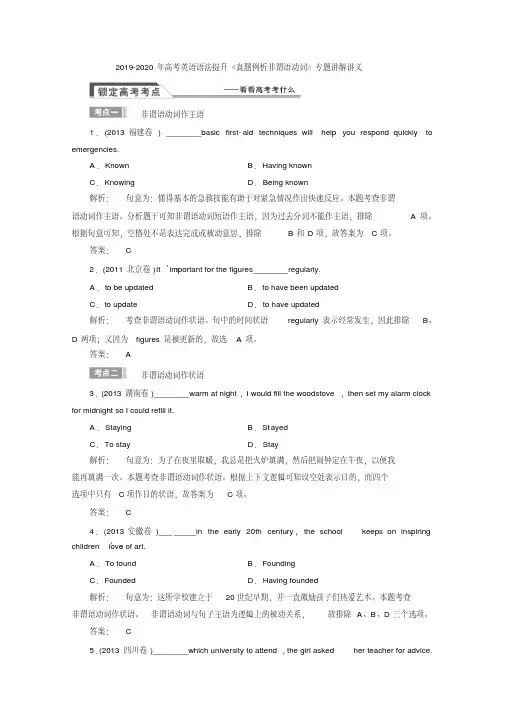
2019-2020年高考英语语法提升《真题例析非谓语动词》专题讲解讲义非谓语动词作主语1.(2013·福建卷) ________basic first-aid techniques will help you respond quickly to emergencies.A.Known B.Having knownC.Knowing D.Being known解析:句意为:懂得基本的急救技能有助于对紧急情况作出快速反应。
本题考查非谓语动词作主语。
分析题干可知非谓语动词短语作主语,因为过去分词不能作主语,排除A项。
根据句意可知,空格处不是表达完成或被动意思,排除B和D项,故答案为C项。
答案: Cimportant for the figures________regularly.2.(2011·北京卷)It’sA.to be updated B.to have been updatedC.to update D.to have updated解析:考查非谓语动词作状语。
句中的时间状语regularly表示经常发生,因此排除B、D两项;又因为figures是被更新的,故选A项。
答案: A非谓语动词作状语3.(2013·湖南卷)________warm at night,I would fill the woodstove,then set my alarm clock for midnight so I could refill it.A.Staying B.St ayedC.To stay D.Stay解析:句意为:为了在夜里取暖,我总是把火炉填满,然后把闹钟定在午夜,以便我能再填满一次。
本题考查非谓语动词作状语。
根据上下文逻辑可知设空处表示目的,而四个选项中只有C项作目的状语,故答案为C项。
答案: C4.(2013·安徽卷)________in the early 20th century,the school keeps on inspiring children’slove of art.A.To found B.FoundingC.Founded D.Having founded解析:句意为:这所学校建立于20世纪早期,并一直激励孩子们热爱艺术。

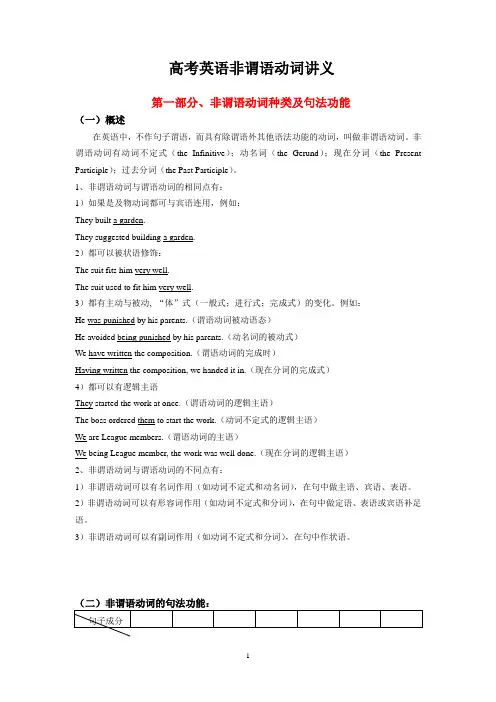
高考英语非谓语动词讲义第一部分、非谓语动词种类及句法功能(一)概述在英语中,不作句子谓语,而具有除谓语外其他语法功能的动词,叫做非谓语动词。
非谓语动词有动词不定式(the Infinitive);动名词(the Gerund);现在分词(the Present Participle);过去分词(the Past Participle)。
1、非谓语动词与谓语动词的相同点有:1)如果是及物动词都可与宾语连用,例如:They built a garden.They suggested building a garden.2)都可以被状语修饰:The suit fits him very well.The suit used to fit him very well.3)都有主动与被动, “体”式(一般式;进行式;完成式)的变化。
例如:He was punished by his parents.(谓语动词被动语态)He avoided being punished by his parents.(动名词的被动式)We have written the composition.(谓语动词的完成时)Having written the composition, we handed it in.(现在分词的完成式)4)都可以有逻辑主语They started the work at once.(谓语动词的逻辑主语)The boss ordered them to start the work.(动词不定式的逻辑主语)We are League members.(谓语动词的主语)We being League member, the work was well done.(现在分词的逻辑主语)2、非谓语动词与谓语动词的不同点有:1)非谓语动词可以有名词作用(如动词不定式和动名词),在句中做主语、宾语、表语。
2)非谓语动词可以有形容词作用(如动词不定式和分词),在句中做定语、表语或宾语补足语。
高中英语语法专题复习03 非谓语动词(不定式、动名词&现在分词、过去分词)非谓语动词谓语动词在句子中有三种作用:1. 表示动作的时间,tense (时)2. 表示动作的状态,aspect (体)3. 表示动作的语气,mood (气)谓语动词的“时体气”,通过动词变位实现。
例如,The rabbit ate a carrot.The rabbit is eating a carrot.The rabbit has eaten a carrot.谓语动词在句子中受到主语的限制,随之出现了时态和人称的变化,成为一种被限定了的动词,所以也被称为限定性动词(finite verb)。
与之相对的,不受主语限制的动词,称为非限定性动词(non-finite verb),也就是非谓语动词。
非谓语动词不具备表达时态和人称的作用。
例如,I like to eat carrot.I liked eating carrot.The rabbit likes minced carrot.非谓语动词有四种形式:1. 不定式 infinitive2. 动名词 gerund3. 现在分词 present participle4. 过去分词 past participle谓语动词是简单句的核心动词,非谓语动词只可能出现在其他的句子成分中。
1. 主语例:Swimming makes us hale and hearty.2. 宾语例:Janet suddenly stopped talking.3. 表语/主语补语例:Her wish is to become a doctor in the future.4. 宾语补语例:I invited him to come here.5. 定语例:Don't disturb the sleeping dog.6. 状语例:He went to the supermarket to buy a pen.不定式、动名词句子的核心动词只能由谓语动词充当,而非谓语动词可以充当句子的其他成分。
非谓语动词非谓语动词包含不定式 (to do) 、动名词 (-ing) 、此刻分词 (-ing) 与过去分词 (- ed)。
它们不受主语人称和数的限制,在句子中不可以充任谓语,但能够充任句子的其余成分,并且有时态和语态的变化。
形式动词不定式动名词 (doing)此刻分词 (doing)过去分词 (done)对照项目(to do)相当于名词、形相当于名词,指常常性、相当于形容词、副词,相当于形容词、副词,自己意义容词、副词,往习惯性的动作常常有此刻意味兼有被动、达成意义往有未来意味主语、宾语、表主语、宾语、表语、定表语、宾补、定语、状充任句子成分语、宾补、定语、表语、宾补、定语、状语语语状语主动一般式to do doing doing done被动式to be done being done being done形式to have done having done having done主动达成式被动达成式to have been done having been done having been done否认式在上述各样非谓语动词形式以前直接加not动词不定式定义:动词不定式是非谓语动词的一种,它没有人称和数的变化,在句子中不可以独立作谓语,但它仍保持动词的特色,能够有自己的宾语和状语。
主动形式被动形式一般式to doto be done达成式to have done to have been done进行式to be doing无达成进行式to have been doing无一、不定式的意义1. 不定式的一般式:一般式表示的动作或状态发生在谓语动词表示的动作或状态的同时或以后。
当不定式的逻辑主语是这个不定式所表示的动作的蒙受者时,不定式一般要用被动式(to be done).eg: He seemed to be tired.The building to be finished next month is for our teachers.2.不定式的进行式:进行式表示动作正在进行,与谓语的动作同时发生。
一、谓语动词与非谓语动词在解非谓语习题时同学们遇到最大的困难之一是如何判别是谓语动词还是非谓语动词。
非谓语动词是汉语中没有的语言现象。
汉语中几个谓语动词连用而动词不用作任何形式的变化。
如:他明天来拜访你。
翻译成英语不是He will come visit you,而是He will come to visit you.这里就用了动词不定式to visit。
因此同学们要特别注意分析句子的结构。
二、非谓语动词的语法功能三、非谓语动词的变化形式(一)非谓语动词做主语、宾语时的比较用不定式还是用动名词作宾语有特殊规定举例①I don’t want ____ like I’m speaking ill of anybody, but the manager’s plan is unfair.A. to soundB. to be soundedC. soundingD. to have sounded【解析】want后要跟动词不定式作宾语,sound是连系动词不用被动式,与谓语动词没有时间的先后,故不可用它的完成式。
答案A。
②It is difficult to imagine his _______the decision without any consideration.A. acceptB. acceptingC. to acceptD. accepted【解析】imagine要求用动名词作宾语。
答案B。
重只接不定式hope, want, offer, long, fail, expect, wish, ask,点做宾语的谓语动词或短语decide, pretend, manage, agree, afford, determine, promise, happen,refuse, claim, would love等等只接动名词做宾语的谓语动词或短语suggest, risk, devote oneself to(建议冒险去献身)finish, imagine, bear/stand, look forward to(完成想象忍盼望)give up, delay/put off, regret, miss(放弃延期悔失去)insist on/stick to, enjoy/appreciate, feel like, practice(坚持欣赏要实践)pay attention to, excuse, escape/avoid, object to(注意原谅逃/避反对)keep, be/get used to/be accustomed to, mind(保持习惯勿介意)be worth, set about/burst out/get down to, be busy (值得开始将忙乎)用不定式还是用动名词作宾语都可以,但有区别举In some parts of London, missing a bus means __________for例another hour.A. waitingB. to waitC. waitD. to be waiting【解析】此题意为“在英国的一些地方,如果错过了公交车就意味着再等一个小时。
高考英语语法讲义一.非谓语动词一.不定式:一)不定式的常考形式:1)一般形式:He decided to work harder in order to catch up with theothers.被动形式: He preferred to be assigned some heavier work to do.语法功能:表示与谓语动词同步发生2)完成形式:He pretended not to have seen me.被动形式:The book is said to have been translated into many languages.语法功能:表示发生在谓语动词之前二)不定式常考的考点:1)不定式做定语----将要发生2)不定式做状语----目的3)不定式充当名词功能---To see is to believe.三)不定式的省略1)感官动词see, watch, observe, notice, look at, hear, listen to, smell, taste, feel+ do表示动作的完整性,真实性;+ doing表示动作的连续性,进行性I saw him work in the garden yesterday.昨天我看见他在花园里干活了。
(强调"我看见了"这个事实)I saw him working in the garden yesterday.昨天我见他正在花园里干活。
(强调"我见他正干活"这个动作)❖感官动词后面接形容词而不是副词:The cake tastes good; It feels comfortable.2) 使役动词have bid make let 等词后不定式要省略但同1)一样被动以后要还原toI ‘d like to have John do it.I have my package weighed.Paul doesn’t have to be made to learn.3) help help sb do help sb to do help do help to do四)有些动词后只跟不定式如:want,wish,hope,manage,promise,refuse,pretend,plan,offer,decide,agree,expect allow sb to do, cause sb to do , permit sb to do, enable sb to doforce sb to do. be more likely to do love to do warn sb to do be able to dobe ambitious to do. begin to do . start to doWe agreed _______ here,but so far she hasn't turned up yet.(NMET 1995)A.having met B.meeting C.to meet D.to have met (Key:C)五) 有的时候to后面要接-ing形式accustom (oneself) to; be accustomed to; face up to; in addition to; look forward to; object to; be reduced to; resign oneself to; be resigned to; resort to; sink to; be used to; be alternative to; be close/closeness to; be dedication/dedicated to; be opposition/opposed to; be similarity/similar to.三、need/want 后的-ing形式具有被动的意思。
专题2 非谓语动词非谓语动词的形式及句法功能非谓语动词的核心考点1.非谓语动词作状语(1)不定式作状语①表示目的I stopped the car to take a short break as I was feeling tired.②不定式作结果状语表示出乎意料的结果,动词不定式前常加only。
George returned after the war,only to be told that his wife had left him.(2)现在分词作状语①一般式doing表示动作和谓语动作同时或几乎同时发生,与句子的主语是主动关系。
The sun began to rise in the sky,bathing the mountain in golden light.(主动关系) ②完成式having done表示动作发生在谓语动作之前。
I got to the office earlier that day,having caught the 7:30 train from Paddington.③被动式having been done表示动作发生在谓语动作之前,与句子的主语是被动关系。
Having been asked to work overtime that evening,I missed a wonderful film.(被动意义,非谓语动词的动作发生在谓语动词动作之前)(3)过去分词作状语过去分词作状语时,与句子主语之间是被动关系。
Seen from the top of the mountain,the city is very beautiful.(被动关系)2.非谓语动词作定语(1)现在分词作定语现在分词(短语)作定语与所修饰的名词之间存在着逻辑上的主谓关系,表示该动作的主动和进行。
Laura was away in Paris for over a week.When she got home,there was a pile of mails waiting for her.(2)不定式作定语不定式作定语表示未做的事情。
His first book to be published next month is based on a true story.不定式作定语的特殊用法:①下列词语后常接不定式作定语:chance,right,courage,promise,time,opportunity,way,the first,the second,the last,the only等。
②不定式作定语和所修饰的名词在逻辑上有主谓关系。
There is no one to look after her.③不定式与被修饰的名词在逻辑上有动宾关系。
She is now looking for a room to live in.(3)过去分词作定语过去分词(短语)作定语与它所修饰的名词在逻辑上有被动关系,表示该动作的被动或完成。
You cannot accept an opinion offered to you unless it is based on facts.His first book published last month is based on a true story.注意:表示心理状态的动词-ing形式,意为“令人……的”;动词-ed形式,意为“(人)感到……的”,也可修饰体现内心感受的look,expression,tears,smile,voice等名词。
3.非谓语动词作宾语(1)动词afford,promise,refuse,expect,hope,learn,offer,wish,want,fail,plan,agree,forget,like,prefer,decide,manage,try,arrange,determine,desire 等后面接不定式作宾语;动词come,get,grow后接不定式作宾语时,意为“逐渐地……”。
David refused to accept my invitation.She has a hot temper,but you will grow to like her.注意:下列单词或短语后可接“疑问词+不定式”作宾语:teach,decide,wonder,show,learn,forget,ask,find out,advise,discuss等。
I don’t know how to deal with this kind of matter.(2)①动词admit,appreciate,avoid,consider(考虑),delay,dislike,enjoy,escape,excuse,finish,imagine,keep,mind,miss,practise,risk,resist,suggest等后要接动名词作宾语。
Bill suggested holding a meeting on what to do for the Expo during the vacation.②动词短语can’t stand,give up,feel like,keep on,insist on,look forward to,put off,devote...to,object to,be busy (in),get down to,have difficulty/trouble (in),have a good/wonderful/hard time (in),have fun等后要接动名词作宾语。
I had great difficulty (in) finding the suitable food on the menu in that restaurant.③介词后要接动名词作宾语,如what about,how about,be fond of,be good at等的介词后接动名词。
注意on/upon doing sth.=as soon as 引导的从句,作此意讲时on/upon 后也可以接名词。
On his arrival/On arriving at the station,he found the train had just started. 注意:①表示一种倾向多接动名词作宾语;表示某一特定的或具体的行动,多接不定式作宾语。
I like listening to music,but today I don’t like to.②want,require,need表“需要”讲,后用不定式时,要用其被动形式;用动名词时,用其主动形式(表被动意义)。
The patient required to be examined.The patient required examining.4.非谓语动词作主语(1)动名词作主语Hearing how others react to the book you have just read creates an added pleasure. It is no use crying over spilt milk.(动名词短语作主语,it作形式主语)(2)不定式作主语To see is to believe.=Seeing is believing.It is important to respect people.(不定式短语作主语,it作形式主语)5.非谓语动词作宾补(1)分词作补语的区别①现在分词作宾补的两大特征:一是宾语与现在分词有主谓关系;二是现在分词所表示的动作正在进行。
可接现在分词作宾补的动词(短语)常见的有:have,see,hear,find,get,leave,notice,watch,keep,start,set,catch,smell,feel,send,listen to,look at等。
I looked up and noticed a snake winding its way up the tree to catch its breakfast.I won’t have you speaking to your dad like that.I heard an English song being sung by a little girl when I passed by her room yesterday.(被动,正在进行)②过去分词作宾补的两大特征:一是及物动词的过去分词作宾补与宾语有动宾关系;二是不及物动词的过去分词作宾补与宾语有主谓关系,多用来表示动作已完成。
可接过去分词作宾补的动词有:have,see,hear,find,leave,want,make等。
Claire had her luggage checked an hour before her plane left.I was surprised to find my hometown changed so much.(2)不定式作补语①接带to的不定式作宾补,此类动词(短语)有:advise,allow,ask,cause,command,encourage,expect,forbid,force,get,invite,leave,like,mean,order,permit,persuade,prefer,request,tell,want,warn,wish,call on,depend on/upon,long for,wait for等。
I didn’t mean you to hear it.We’re all longing for the new term to begin.②接不带to的不定式作宾补的动词(短语)有:make,have,let等使役动词以及see,watch,notice,observe,look at,feel,hear,listen to等感官动词。
如果这些动词或短语用于被动语态,则to不可省略。
动词help后的不定式符号to可以省略,也可以保留。
Let those in need understand that we will go all out to help them.She was seen to enter the manager’s office ten minutes ago.(3)with+宾语+宾补The man felt very happy with so many children sitting around him.John received an invitation to dinner,and with his work finished,he gladly accepted it.With a lot of difficult problems to settle,the newly-elected president is havinga hard time.6.非谓语动词作表语(1)动名词作表语时,说明主语的内容。